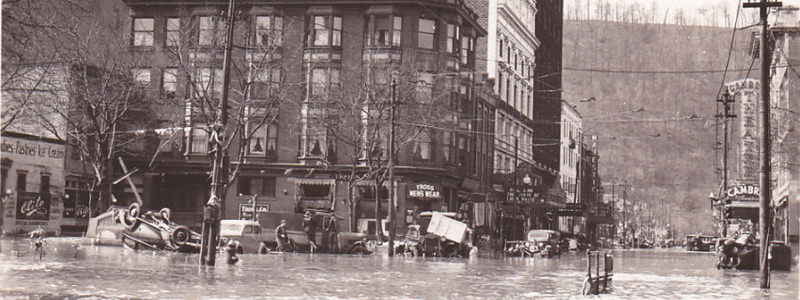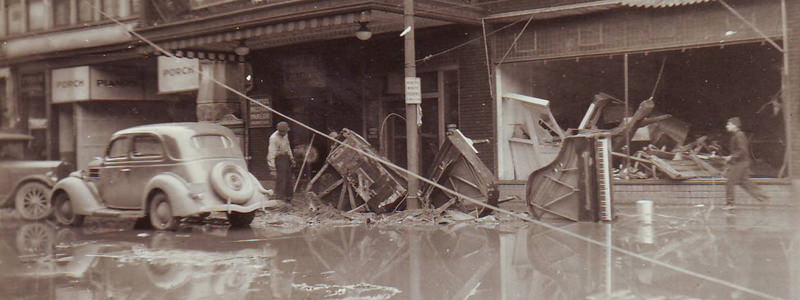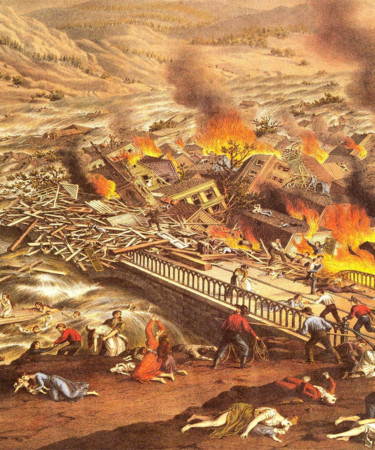When it comes to alcohol control, Pennsylvania is one of the most restrictive states in the country – import into the state is strictly regulated, and consumers must shop at specific state controlled stores if they wish to purchase their favorite wine, whiskey or beer.
Restaurants are at the state’s whims as well, having the ability to only buy what the state’s alcohol board permits in, which is often very limited and has more to do with backroom deals than quality. And if the restriction wasn’t enough, to add insult to injury, the prices of booze in Pennsylvania are very high, especially when compared to neighboring states. And for all of this, the residents can thank not a desire to limit vice but an almost hundred-year-old flood which resulted in a temporary law that was simply never repealed once government officials realized how much money that little law could make them in profits.

Johnstown, PA has unfortunately seen its fair share of floods. In 1889 the most horrific flood – one of the worst in U.S. history – hit the town when the dam that held the water back in order to protect the town gave way after days of torrential rain. 2,209 people perished, almost 7% of the town’s population, and the flood inflicted over $17 million (which would be $425 million today) in damages. While damages were ultimately repaired, the town wasn’t free from floods and flooding hit Johnstown again in 1894, 1907, 1924 and finally 1936, when something known as the Johnstown Flood Tax was finally passed, and the U.S. Army Corps of Engineers were finally brought in to solve the whole flooding issue.
After five pretty terrible floods, you can be sure that the town was pretty sick of the whole flooding business, and they demanded that the government help to put a stop to it. Too many lives had been lost and many businesses had been ruined. The citizens wanted significant financial support to not only rebuild but also prevent these floods from continuing to happen, so they did what many Americans do, they lobbied the government.

The result of their lobbying efforts was the emergency passage of the Johnstown Flood Tax, a 10% tax on every bottle of alcohol sold in the state, with all profits going to rebuild the city. Once the money was raised, it was understood that the tax would be repealed, and things would go back to normal. But since no one was quite sure how long it might take to raise all of the funds, the government was allowed to extend the tax as needed, until all the money was raised to rebuild the city. However, pretty much immediately after the passage of the tax, the money began pouring in – after all, the state was taxing one of their citizens’ favorite vices. The state of Pennsylvania raised so much money that by 1942 they had sufficient funds to completely rebuild Johnstown, but the tax stayed – government officials diverted the proceeds to the state’s general operating fund, nothing still goes to Johnstown.
It seems the government wised up pretty quickly to how much money could be made from this emergency measure, and so they kept extending the tax, finally making in permanent in 1951, and even increasing it from 10% to the 18% it sits at today. Since its passage in 1936, the Johnstown Tax has generated almost $5 billion in revenue for the state.
However, most Pennsylvanians don’t really know about the tax, they just know they pay higher prices for alcohol than other states. That’s because when a consumer checks out at one of the state controlled stores, all they’re shown on their receipt is the addition of a 6% sales tax, the Johnstown Tax has already been included in the markup of the product. For example, a $15.99 bottle of wine already includes the $2.44 tax – without the tax that bottle would sell on the shelf for $13.55.
There have been several efforts to repeal the tax over the years, but they’ve all failed for one reason or the other. In the end, Pennsylvanians are probably stuck with the tax, all thanks to a 1936 flood and a town that had simply had enough.
